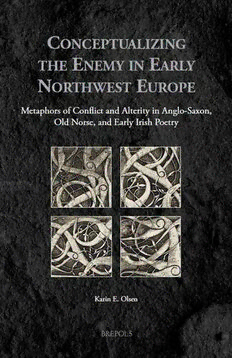
Conceptualizing the Enemy in Early Northwest Europe: Metaphors of Conflict and Alterity in Anglo-Saxon, Old Norse, and Early Irish Poetry PDF
Preview Conceptualizing the Enemy in Early Northwest Europe: Metaphors of Conflict and Alterity in Anglo-Saxon, Old Norse, and Early Irish Poetry
Conceptualizing the Enemy in Early Northwest Europe MedieVal identities: socio-cultural sPaces Editorial Board under the auspices of the Centre for Medieval Studies, University of Hull adrian P. tudor, University of Hull anu Mänd, Tallinna Ülikool (Tallinn University) lesley a. coote, University of Hull ildar H. Garipzanov, Universitetet i Oslo catherine emerson, National University of Ireland, Galway Previously published volumes in this series are listed at the back of the book. Volume 6 Conceptualizing the Enemy in Early Northwest Europe Metaphors of Conflict and alterity in anglo-saxon, old Norse, and Early irish Poetry by Karin E. olsen British library Cataloguing in Publication data a catalogue record for this book is available from the British library © 2016, Brepols Publishers n.v., Turnhout, Belgium all rights reserved. No part of this publication may be reproduced, stored in a retrieval system, or transmitted, in any form or by any means, electronic, mechanical, photocopying, recording, or otherwise, without the prior permission of the publisher. d/2016/0095/31 isBN 978-2-503-55227-9 doi 10.1484/M.MisCs-EB.5.106934 e-isBN 978-2-503-56093-9 Printed on acid-free paper Contents Preface vii Chapter 1. Metaphor, alterity, and the Early Poetry of Northwest Europe 1 Chapter 2. Heathen Gods and their Enemies in old English, old Norse, and Early irish Poetry 29 Chapter 3. Marginalizing the Enemy in the Heroic Poetry of Early Northwest Europe 93 Chapter 4. defaming the Enemy in the occasional Poetry of Early Northwest Europe 171 Conclusion 209 Bibliography 213 index 241 in memory of my parents Preface this book presents the results of a long-term research project that grew from my joint interests in conceptual metaphor and in the language employed in old English, old Norse, and early irish poetry. intending to redress a lacuna in the fields of Comparative literary analysis, Cultural anthropology, and Conceptual Metaphor, the study explored the ways in which the metaphorical language of poetic discourse is culture-sensitive and the extent to which such sensitivity can be detected in anglo-saxon, old Norse, and early irish poetry. No cross-cultural comparative analysis that combined approaches from the three research fields for an investigation of the cultural enmeshing of the North sea world had yet been attempted, even though comparable literary traditions invited such an investigation. Given the comprehensiveness of the project, i restricted my examination to those metaphorical techniques that sug- gest different conceptualizations of the enemy and culture-specific concepts of otherness in anglo-saxon, old Norse, and early irish poetry. over the years the project took different turns before it attained its present form as a monograph that applies concepts from Cognitive science and Cultural anthropology for the cross-cultural exploration of notions of alterity in three different poetic corpora. The comparative nature of this work has required some compromises. to accommodate readers who do not specialize in one or more of the literary cor- pora discussed in the book and to prevent lengthy digressions from the main objective of the investigation, only scholarly discussions of linguistic and con- textual features relevant to my analysis have been included. spelling variants of the words analyzed in the book have been standardized, nouns presented in their nominative forms, and the word order of kennings regularized. in fact, close proofreading and formatting of a monograph that includes old English, old Norse, and early irish terminology has been a formidable task, for which i am grateful to the copy editor, tim Barnwell. i also owe thanks to everyone else viii Preface who supported me in the writing of this book, in particular antonina Harbus, Jennifer Neville, and John Flood for their helpful comments on the individual chapters, and robert olsen for reading the final text. i am especially grateful to sebastian sobecki, whose professional views and encouragement have greatly influenced the progress of the project. all this support proved to be invaluable.
